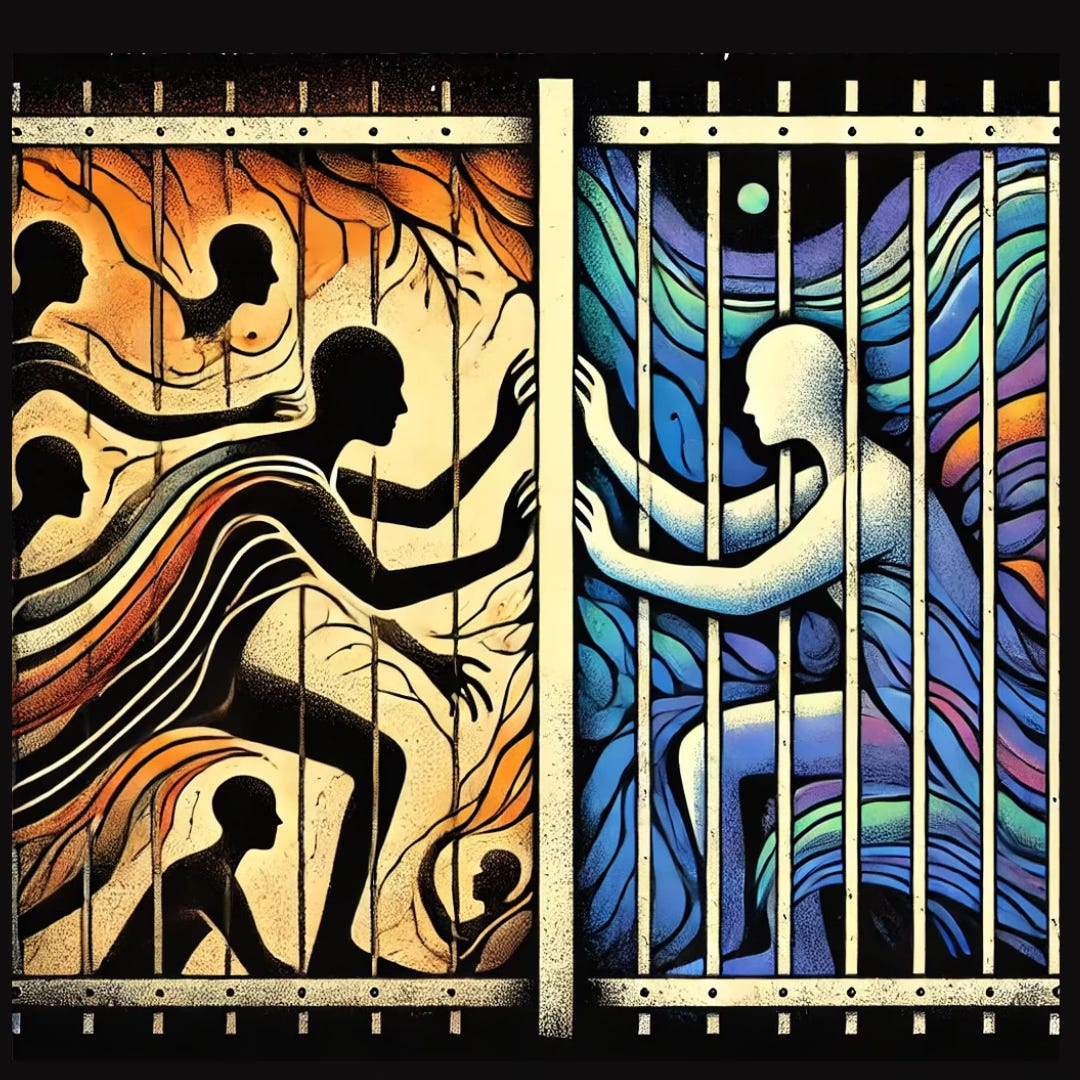The Prisons We Create for Others, Become Our Own
How Fear and Control Trap Both Sides of the Barrier in the Quest for Power and Allyship
Introduction:
Welcome back to our ongoing series on building true allyship. Before we dive in, I invite you to pause. Take a deep breath, have some water, and maybe even move your body. This is grief work, a journey through what we know and what we need to unlearn. To dismantle supremacy culture, especially within white spaces, is sacred work that requires us to face uncomfortable truths with honesty and compassion.
One of my favorite quotes is by Rumi: “Your task is not to seek for love, but merely to seek and find all the barriers within yourself that you have built against it.” This quote has had such a profound impact on my life that I had it tattooed on my arm. For me, it’s a constant reminder that love, not fear, is the foundation upon which we must build. This sentiment applies to dismantling the barriers of allyship as well, because where fear is allowed to lead, power and control are often sought instead of connection.
In our last article, Inside-Out Allyship: Building True Solidarity Within White Communities, we explored how allyship must be grounded in accountability. True allyship, we discussed, isn’t just about reaching outward—it must start within white spaces, rooted in honest self-examination and shared responsibility.
Today, we go deeper, examining the fear of losing power that often prevents white communities from achieving genuine allyship. This fear, often hidden beneath the surface, reveals an unsettling truth about the nature of whiteness: it is a construct that only “bands together” in seeking power over others. This structure of whiteness not only keeps others out but traps white-bodied people within. By facing this fear and the structures it upholds, we open pathways toward authentic solidarity.
The Sacred Weight of Fear
Fear is not just an individual experience—it’s collective, layered with generations of conditioning. In white spaces, fear around losing power or status is a central barrier to true allyship. For many, allyship feels like a loss of identity, which brings me back to the question I always ask: “Who were you before you were white?” as whiteness is tied not to culture but to a perceived superiority and control that are dependent on “power over.” Facing this fear is grief work, a release of identities built on separation and dominance.
This fear within white communities is complicated because it serves a dual purpose: it keeps those outside the community at bay, therefore maintaining a sense of superiority for the white-bodied people who adhere to the constructs of whiteness (Cis, Wealthy, Christian, Able-bodied, white) and it also confines those marginalized white-bodied people within, preventing white-bodied individuals from experiencing true liberation. To confront this fear is to acknowledge the weight of this isolation and the cost of maintaining barriers that ultimately restrict everyone.
The Roots of the Fear of Losing Power
Historical Conditioning
Whiteness as a construct was created to uphold systems of power. For centuries, whiteness was a tool of colonialism, designed to create hierarchies and entrench control. This conditioning means that many white-bodied individuals have come to view equality not as a shared goal but as a loss. As such, the idea of equity and shared humanity may evoke fear, as it challenges the comfort and identity built around dominance.
The Illusion of Scarcity
Supremacy culture perpetuates a myth of scarcity, suggesting that power and resources are finite. (We could look at the continent of Africa to see that is untrue, even through the multiple centuries of exploitation her land and her people are still yielding.) This creates a perception that sharing power is inherently threatening as if it diminishes those who do. The fear rooted in scarcity leads to resistance against sharing influence or stepping back, even though collective empowerment could lead to a more just society.
Identity and Self-Worth
Because whiteness lacks cultural grounding, self-worth is often tied to the power structures it has created. When allyship requires giving up control, embracing equality, or creating equity, it may feel like a threat to one’s very identity. This dependency on “power over” limits opportunities for authentic connection, even within white communities themselves.
How Fear Manifests in Allyship Efforts
Defensiveness and Dismissal
When confronted with conversations about privilege, fear can manifest as defensiveness, with individuals quick to dismiss criticism or deny systemic issues. This reaction perpetuates supremacy culture by stalling important conversations and reinforcing isolation.


